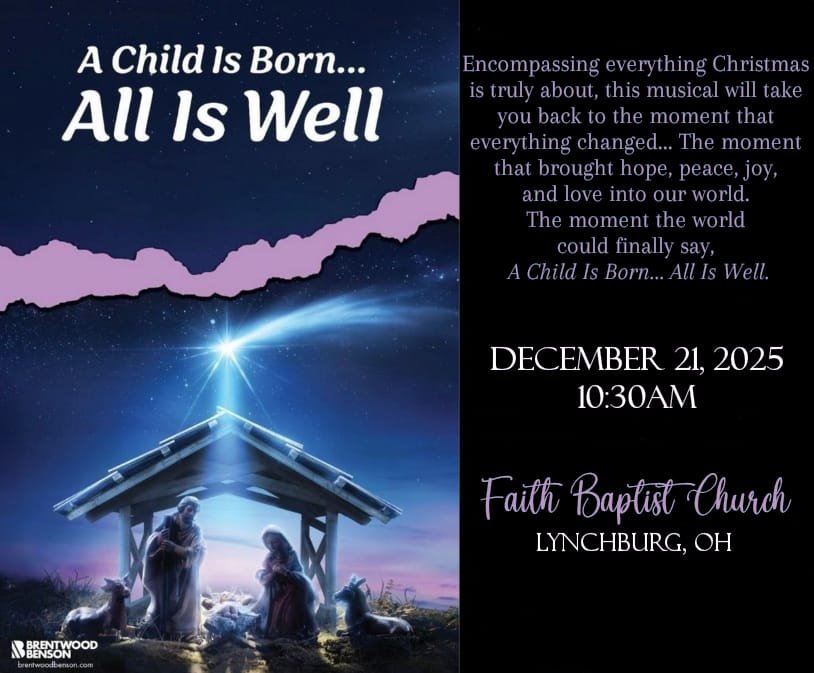Our Spiritual Heritage
We were well served as a mission for 3 years (1968-1971) by our sponsoring church, Moore’s Fork Baptist Church and her pastor, Bro. James K. Gardner. They laid the foundation for us to build upon, with Jesus Christ being the chief cornerstone.
As a church, we have stayed on the course they set us on. We haven’t changed our doctrine, our character, nor the standards that they passed on to us.
Change, for the sake of change, is foreign to the unchanging Word of God and the eternal person and authority of Jesus Christ. We believe the New Testament Church of the Bible is still the model for New Testament Churches of today, as there is just One Lord, One Faith, One Baptism, One Spirit, One Body, etc. The world changes, people change, but the truth of God remains the same. It is the duty of each New Testament Church to earnestly contend for the faith once delivered to the saints (Jude 3).
The truth of these New Testament times is not diverse from the truth of Old Testament times: “All scripture is given by inspiration of God, and is profitable for doctrine, for reproof, for correction, for instruction in righteousness: That the man of God may be perfect, throughly furnished unto all good works.” 2 Timothy 3:16-17
Our doctrines are only as correct as they agree with the principles that God set forth in the Old Testament. Christianity is the fulfillment of the Old Testament, not the destruction of it. “Think not that I am come to destroy the law, or the prophets: I am not come to destroy, but to fulfill. For verily I say unto you, Till heaven and earth pass, one jot or one tittle shall in no wise pass from the law, till all be fulfilled. Whosoever therefore shall break one of these least commandments, and shall teach men so, he shall be called the least in the kingdom of heaven: but whosoever shall do and teach them, the same shall be called great in the kingdom of heaven.” Matthew 5:17-19
The God of the Old Testament is the God of the New Testament. The Savior of the Old Testament is the Savior in the New Testament. Sin originates with Satan, not with dispensations of time. What was of Satan in the Old Testament is still of Satan in the New Testament, and what was of God in the past is still of God in the present. God and Satan have not switched places, nor exchanged principles. “Whosoever committeth sin transgresseth also the law: for sin is the transgression of the law.” 1 John 3:4
THE TRUTH CHANGES NOT!
SHARINGNeglect
“How shall we escape, if we neglect so great salvation?” Hebrews 2:3a
The answer to this question is found in the rest of the chapter. It took Christ being incarnated into human flesh, to be tempted in all points like as we are, yet without sin, to provide the means for our spiritual success by His victorious power. Only by faithfully looking to Christ, cleaving to Him, and doing what He tells us to do will we be made an overcomer by and through Him.
A person who continues to drive their vehicle while neglecting to fill their fuel tank cannot escape. A person who quits eating, no matter how great their health, cannot escape the consequences. When we need something to make an accomplishment and we neglect it, there is no escape. To neglect being what Christ commands us to be is to be without what we need to overcome spiritually. John 15:4-5 makes this point very well on the absolute need of abiding in Christ. SINCE WE CAN DO NOTHING APART FROM ABIDING IN CHRIST, WE CANNOT ESCAPE WHEN WE NEGLECT BEING WHAT A SAVED PERSON IS SUPPOSED TO BE AND DO.
Neglect is when we fail to make the response God’s Word commands us to make. When one neglects, it often seems to be a relief from the strain or hardship of doing, but turns out to be a hardship due to the needed result not coming to pass due to the neglect. So while a person is neglecting Bible study, church attendance, or God’s other commands for some ‘needed relief,’ it only becomes a hardship due to coming up short on what one needs for spiritual success.
Neglect works to sear the conscience, raise up indifference in the mind and hardness in the heart because it is the process of denying the Truth its rightful place in the heart and mind. Neglect robs one of “being blessed in their deed as a doer.” Neglect is the admission of the process of backsliding. By neglect, one extinguishes the fires of interest to do the Lord’s work and prevents the joy of being in the sweet fellowship with Christ. Neglect will wither the branch on the Vine.
Neglect sends the wrong signals to everyone else. Neglect destroys the credibility of one’s profession of faith. By neglect, vows are left undone and broken. Neglect becomes a dishonor unto Christ who freely gave His all for us. Neglect discourages and disheartens others and abandons the work, leaving it to fall on others. Neglect is truly one recourse that Satan will do his best to encourage.
To neglect to do what we should makes us liable for what that neglect results in. Thus the results of neglect far exceed the act of neglect. Neglect will break down even the most solid relationships.
To neglect doing what one should do prepares the heart and mind to allow one to start doing the things they shouldn’t do. The sins of omission embolden one unto the sins of commission.
DO NOT ERR MY BELOVED BRETHREN!
SHARING58th Anniversary Special Service



